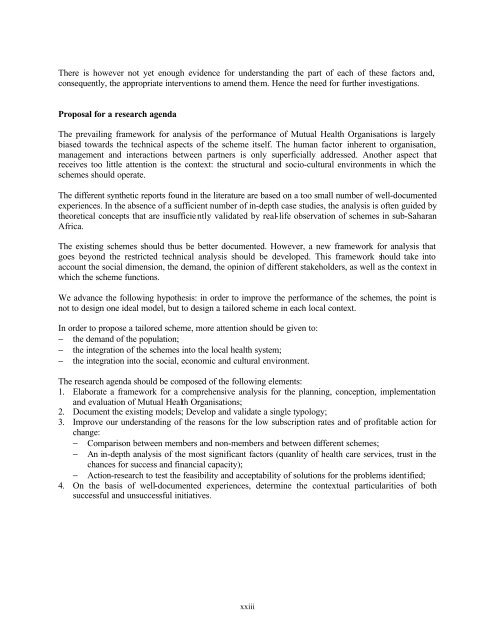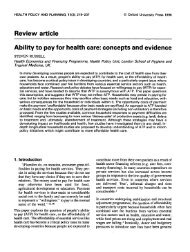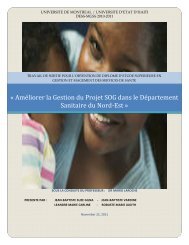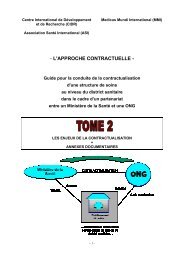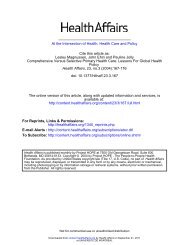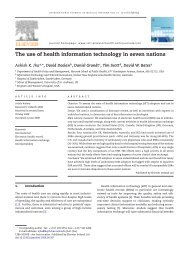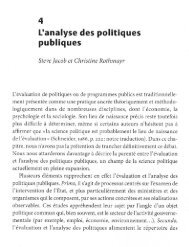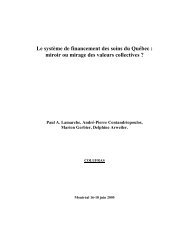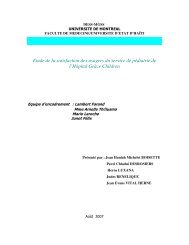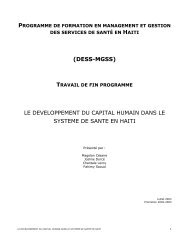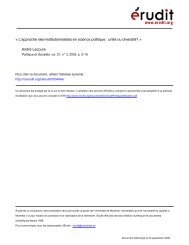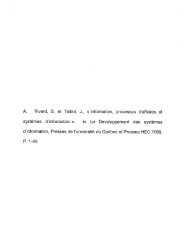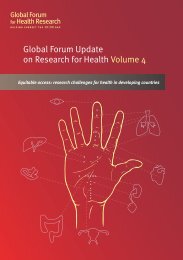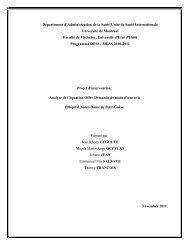LES MUTUELLES DE SANTÃ EN AFRIQUE SUB-SAHARIENNE ...
LES MUTUELLES DE SANTÃ EN AFRIQUE SUB-SAHARIENNE ...
LES MUTUELLES DE SANTÃ EN AFRIQUE SUB-SAHARIENNE ...
You also want an ePaper? Increase the reach of your titles
YUMPU automatically turns print PDFs into web optimized ePapers that Google loves.
There is however not yet enough evidence for understanding the part of each of these factors and,<br />
consequently, the appropriate interventions to amend them. Hence the need for further investigations.<br />
Proposal for a research agenda<br />
The prevailing framework for analysis of the performance of Mutual Health Organisations is largely<br />
biased towards the technical aspects of the scheme itself. The human factor inherent to organisation,<br />
management and interactions between partners is only superficially addressed. Another aspect that<br />
receives too little attention is the context: the structural and socio-cultural environments in which the<br />
schemes should operate.<br />
The different synthetic reports found in the literature are based on a too small number of well-documented<br />
experiences. In the absence of a sufficient number of in-depth case studies, the analysis is often guided by<br />
theoretical concepts that are insufficie ntly validated by real-life observation of schemes in sub-Saharan<br />
Africa.<br />
The existing schemes should thus be better documented. However, a new framework for analysis that<br />
goes beyond the restricted technical analysis should be developed. This framework should take into<br />
account the social dimension, the demand, the opinion of different stakeholders, as well as the context in<br />
which the scheme functions.<br />
We advance the following hypothesis: in order to improve the performance of the schemes, the point is<br />
not to design one ideal model, but to design a tailored scheme in each local context.<br />
In order to propose a tailored scheme, more attention should be given to:<br />
− the demand of the population;<br />
− the integration of the schemes into the local health system;<br />
− the integration into the social, economic and cultural environment.<br />
The research agenda should be composed of the following elements:<br />
1. Elaborate a framework for a comprehensive analysis for the planning, conception, implementation<br />
and evaluation of Mutual Health Organisations;<br />
2. Document the existing models; Develop and validate a single typology;<br />
3. Improve our understanding of the reasons for the low subscription rates and of profitable action for<br />
change:<br />
− Comparison between members and non-members and between different schemes;<br />
− An in-depth analysis of the most significant factors (quanlity of health care services, trust in the<br />
chances for success and financial capacity);<br />
− Action-research to test the feasibility and acceptability of solutions for the problems identified;<br />
4. On the basis of well-documented experiences, determine the contextual particularities of both<br />
successful and unsuccessful initiatives.<br />
xxiii


